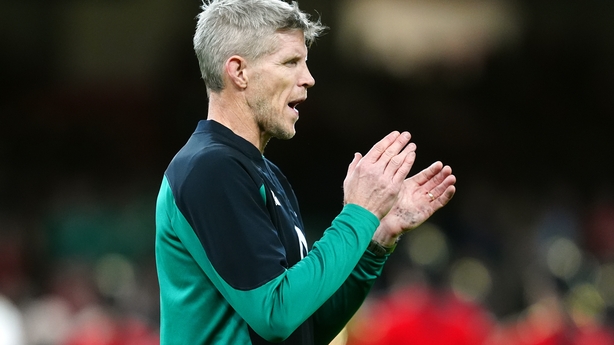If you think you've seen Irish players being held up over the tryline a lot in this Guinness Six Nations, then you are not alone.
It’s become one of the main discussion points following last Saturday’s defeat to France, but the sight of Caelan Doris and Conor Murray being swallowed up as they tried to cross the line at the Aviva just under a week ago felt like a familiar one.
Scanning through Ireland’s four games of this championship, Simon Easterby’s side have been held up over the line five times.
The opener against England was the only match in which Ireland didn’t get over the line without grounding the ball, although they did concede a turnover from a second half maul that was stopped just short.
Against Scotland in round two, Rónan Kelleher and Doris were both held up in the opening quarter as Ireland looked to press home their advantage, while Mack Hansen suffered a similar fate after 65 minutes in the win against Wales.
On Saturday, Gregory Alldritt denied Doris from close range during Ireland’s early period of dominance, while a swarm of French players won a turnover off Murray late in the game when he sniped for the line at the back of a lineout.
While Ireland have been held up five times, they’ve only done so to their opposition once.
In previous years that statistic would be less of an issue, but since World Rugby introduced a goal line drop-out in place of a five-metre scrum in 2021, being held up now comes with a considerable territorial retreat.
9mins IRE 0-0 FRA
— RTÉ Sport (@RTEsport) March 8, 2025
Caelan Doris is held up as he looked to score the first try of the game.
📱 Follow live https://t.co/YNToX44WC0
📺 Watch on @RTE2 and @RTEPlayer
📻 Listen Saturday sport @RTEradio1 pic.twitter.com/xsHAgFGBC0
With that incentive for the defence, there is now a real art in the ability to soak a tackle and allow yourself to cushion the fall of a ball-carrier and trap the ball, like Alldritt did to Doris last week, or Jordie Barrett did to Kelleher in the World Cup quarter-final in 2023.
As Ireland's interim coach - and regular defence expert - Easterby explains, it's an area where teams have upskilled in recent years.
"I think there is a definitely a bit of a work-on in there because sides know that once a team gets over the line, it’s no longer a scrum, it’s a goal line drop out so you’re attacking then from a lot further out," he said of his side’s struggles in converting chances close to the line.
"It is definitely something you have a feel in trying to work out [defensively].
"What you don’t want to do is concede ground to let a team get over the line, but if there is certain situations where a player is going to get over the line, then there are definitely techniques you use to prevent him from grounding the ball. And hopefully referees pick it up."

Getting into a scoring position isn’t proving difficult for Ireland, but even aside from being held up over the line, they have struggled to take their chances when in position to score.
With 13 tries from 39 entries to the opposition 22, Ireland’s 33% return for tries in that zone is the second lowest in the competition, with only this Saturday’s opponents Italy (27%), scoring fewer tries per 22 entry.
Similarly, they rank second highest for turnovers conceded per 22 entry, losing the ball on 43% of the times they have got into that area, with only Scotland (52%) conceding more.
While Ireland got away with that profligacy in their opening three games, it was punished by France last weekend.
After dominating the opening quarter of the game at the Aviva, which included Doris being held up over the line on six minutes, Ireland were held scoreless before Joe McCarthy’s yellow card led to Louis Bielle-Biarrey's opening try.
"Generally we're a team that when we get into the 22, we're very clinical and we're good in that area of the pitch," second row James Ryan (below) said.

"Certainly, when you get close to the line and you get forwards in twos and threes and getting into shape, we talk about trying to play underneath them. We don't want to get held up, because it's not like you get a scrum five anymore. It's a goal line dropout, so it can be a big moment.
"I think the main area was that we weren't clinical enough in that first 20 [against France].
"We dominated possession and territory in that first 20 minutes. We had a number of entries to their 22, but it was 5-0 to France after 20.
"Certainly, when we get into the 22 [this week], being able to be a bit more ruthless than we were on Saturday is definitely something that we have taken as a lesson from the game.
"They were better than we were, a lot more clinical when they came into our half, and scored more often than not. We have to be better this week."
The Leinster lock doesn’t believe the issue lies solely in physicality.
While a power deficit is often brought up when Ireland lose big games, their record against the French and South Africa across the last four years would indicate they are capable of mixing it with the most physical sides in the game.
And Ryan doesn’t accept the argument that Ireland are lacking in power.
He said: "It might be a little simplistic because our set-piece was good. We were 100% at the scrum.
"Our defence wasn't where it needed to be. We probably didn't put ourselves in the positions to be as effective as we would have liked to be, if that makes sense. When the ball went away from us we didn't work as hard as we usually do.
"I think a lot of it was our work off the ball. Usually we would be very good at it, but we were a bit slow to load, to get set."
Listen to the RTÉ Rugby podcast on Apple Podcasts, Spotify or wherever you get your podcasts.
Watch Italy v Ireland (from 1.15pm) and France v Scotland (from 7.30pm) in the Guinness Six Nations on RTÉ2 and RTÉ Player this Saturday.
Follow a live blog of both games on rte.ie/sport and the RTÉ News app, and listen to live commentary of Italy v Ireland on Saturday Sport on RTÉ Radio 1


